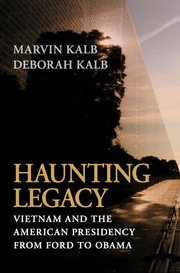Q&A with Stephen Hess of the Brookings Institution
 Monday, April 30, 2012 at 5:29PM
Monday, April 30, 2012 at 5:29PM Stephen Hess, a well-respected expert on Washington's political culture, has written many books on the presidency, the media, and related topics. He is a senior fellow emeritus in governance studies at the Brookings Institution, and worked in both the Eisenhower and Nixon administrations.
Q: You have spent many years studying the interplay between the press and the government. What impact did the Vietnam War have on that relationship?
A: During the period of my studies, The Washington Reporters (1981) and The Government/Press Connection (1984), there was no doubt of the profound impact the Vietnam War had on this relationship. The question I would want to ask now is what change is generational. Do reporters born after Vietnam still professionally carry forward the government/press lessons of Vietnam? Haunting Legacy successfully makes the case of Vietnam’s DNA in the presidency. But would the same be true in journalism? Daily journalists do not have the same historical memory as presidents or secretaries of state. Journalism is an occupation that is born anew each morning. And maybe that’s old-fashioned: given the technological changes, born anew each nanosecond. Indeed, it would be a fascinating study if the Kalbs asked the same questions about journalism that they asked of the presidency.
Q: As a scholar of the presidency, do you feel that the Vietnam War weakened the institution of the presidency? Why or why not?
A: The remarkable resiliency of the presidency is one of the more notable characteristics of the United States. From the shame of Richard Nixon’s resignation to Ronald Reagan’s “morning in America ” was barely a decade. Or a nation mortified by defeat in Vietnam soon felt itself bold enough to invade Kuwait. I don’t think I would have had as much fun studying the presidency had it been otherwise.
Stephen Hess has also graciously offered some additional reflections on his time spent working in the White House during the Nixon administration, when the Vietnam War was underway:
During Nixon’s 1968 campaign, my field was domestic, but once in March I was recruited to debate Henry Kissinger before a large audience of youth in Boston. “Debate” isn’t quite the right word because I kept deferring to Henry, who was speaking for Nelson Rockefeller. I was surprised at how nervous Henry was. I doubt he’d ever addressed 16-year-olds before. I kept my remarks focused on abolishing the draft, Nixon’s only proposal that I figured youth would support. I probably won the debate! I didn’t see Henry again until the GOP convention in Miami. Nixon had a lock on a first-ballot nomination, but Henry assured me that Rockefeller would win on the third ballot.
In 1969, Kissinger and I, both on the White House staff, had offices across the hall from each other in the basement of the West Wing. We also happened to use the men’s room at the same time each morning. Standing side by side one morning, Henry said, “You were right, Steve, he [Nixon] is the right man for this moment in history.” Thus ended our debate. We also had a morning ritual where I said, “Good morning, Henry, when are you going to end the war so that we can have some money for domestic concerns?” (I was deputy assistant to the president for urban affairs.) And Henry replied, “Good morning, Steve, when can you start a riot, distracting the press, so that I have time to end the war?” This is usual staff banter. But Vietnam’s draining the treasury was very real and very serious at a time of urban crisis. It’s useful to think of Vietnam in more than an international context.
In terms of Kissinger’s request for a domestic “riot,” the war was doing that without any help from me. We did have a number of unannounced meetings with youth leaders. Perhaps they helped us better understand each other. Nothing more. I do remember looking out my West Wing window one morning and seeing an unpainted fence around Lafayette Park. I immediately called upstairs to John Ehrlichman. “John. There’s an unpainted fence around Lafayette Park.” “So what?” “John, can you imagine what the president will see on the fence when he looks out his window tomorrow?” (I used stronger words on what the message would say.) “What do you suggest?” “If you get the paint, I’ll get the schoolchildren of Washington to paint a mural.” It was done and the mural of American history was briefly a tourist attraction. And so I fought the war against unruly youth.
In November 1969, the president appointed me National Chairman of the White House Conference on Youth, and I made a lot of speeches on college campuses. Speeches would not ease youth’s feelings about Vietnam, but at least they suggested that someone from government would come and listen. I remember one painful appearance at the College of Wooster in Ohio, where an especially abusive student kept shouting at me. When I was in the Green Room waiting to leave, she came to apologize for her language. This was unexpected and appreciated. Where was she from? Arlington, Virginia. Her father worked for the CIA. Oh my.
Interview with Deborah Kalb, co-author of Haunting Legacy.



Reader Comments